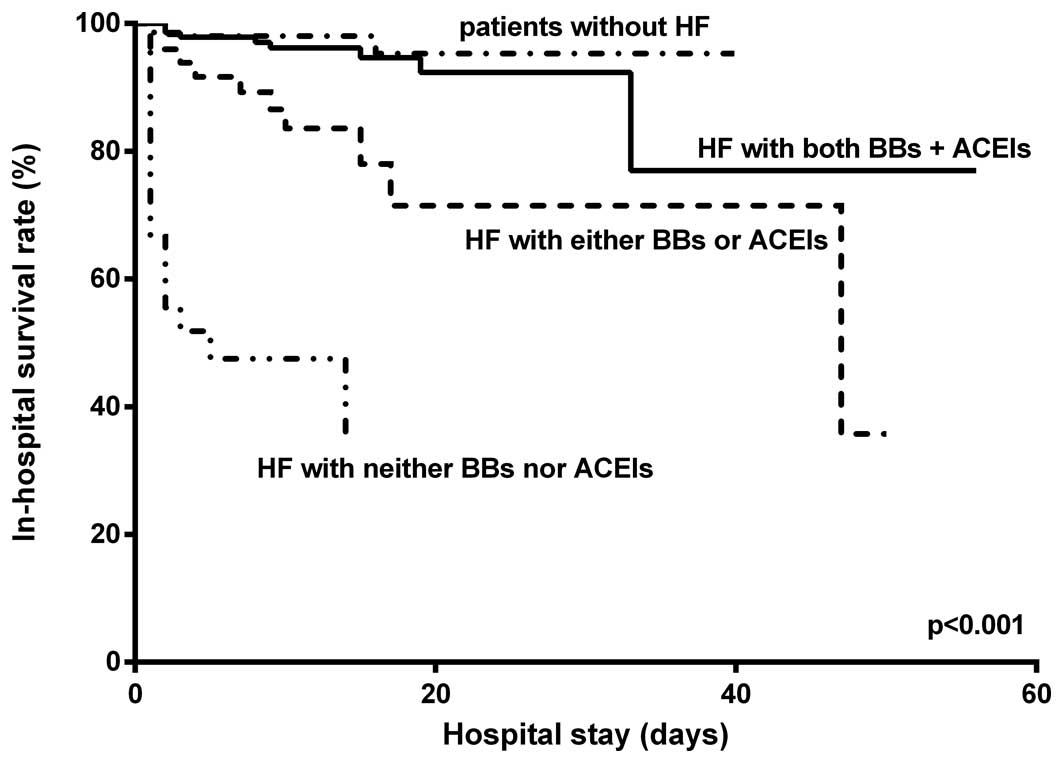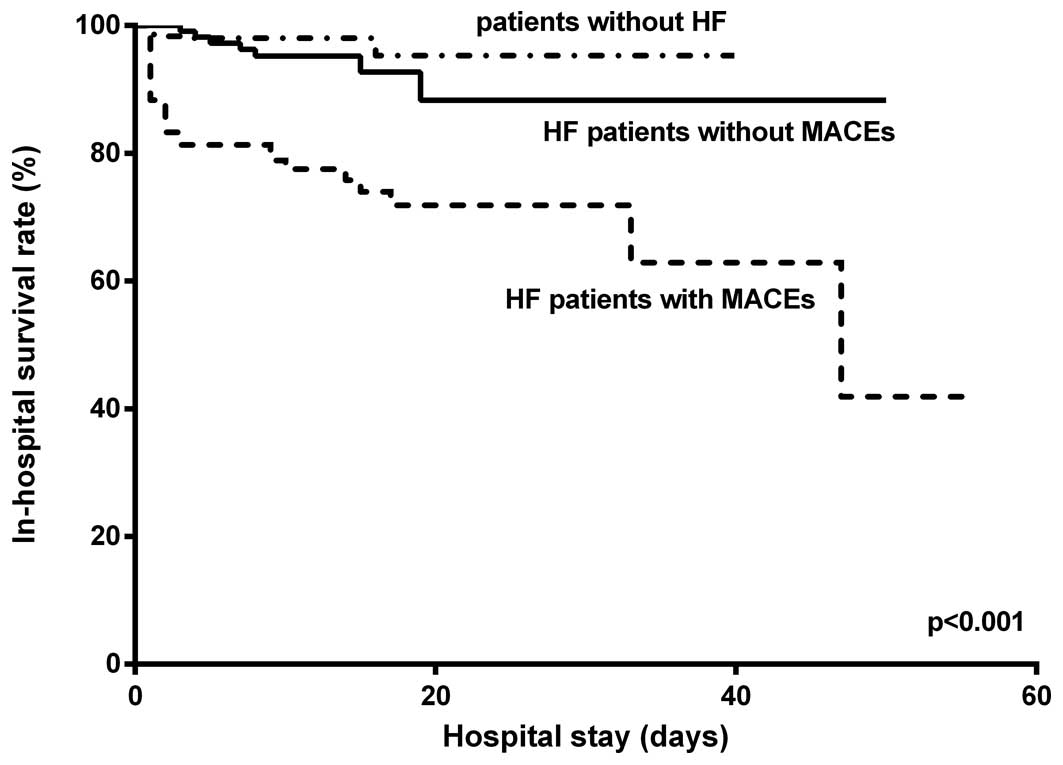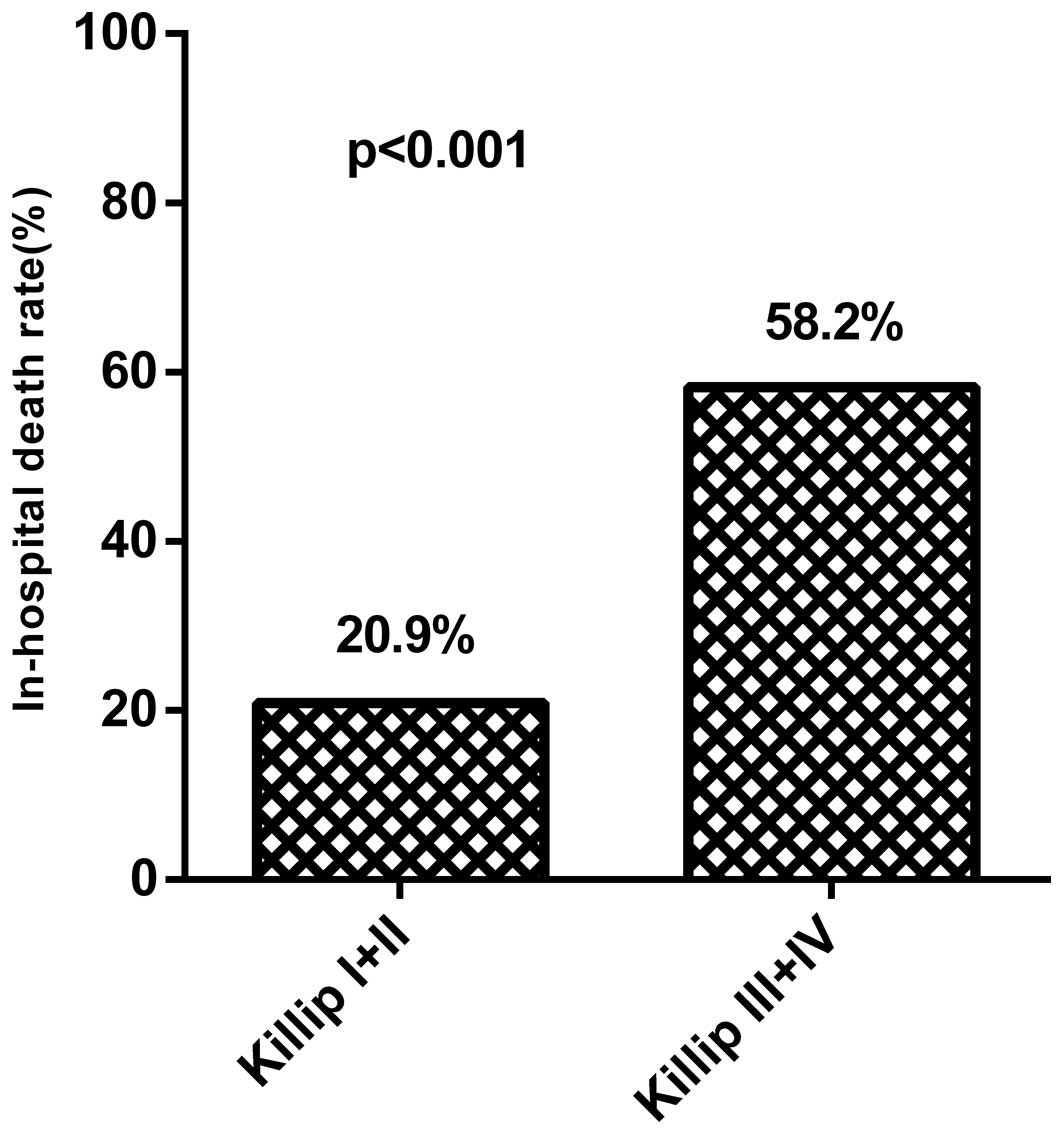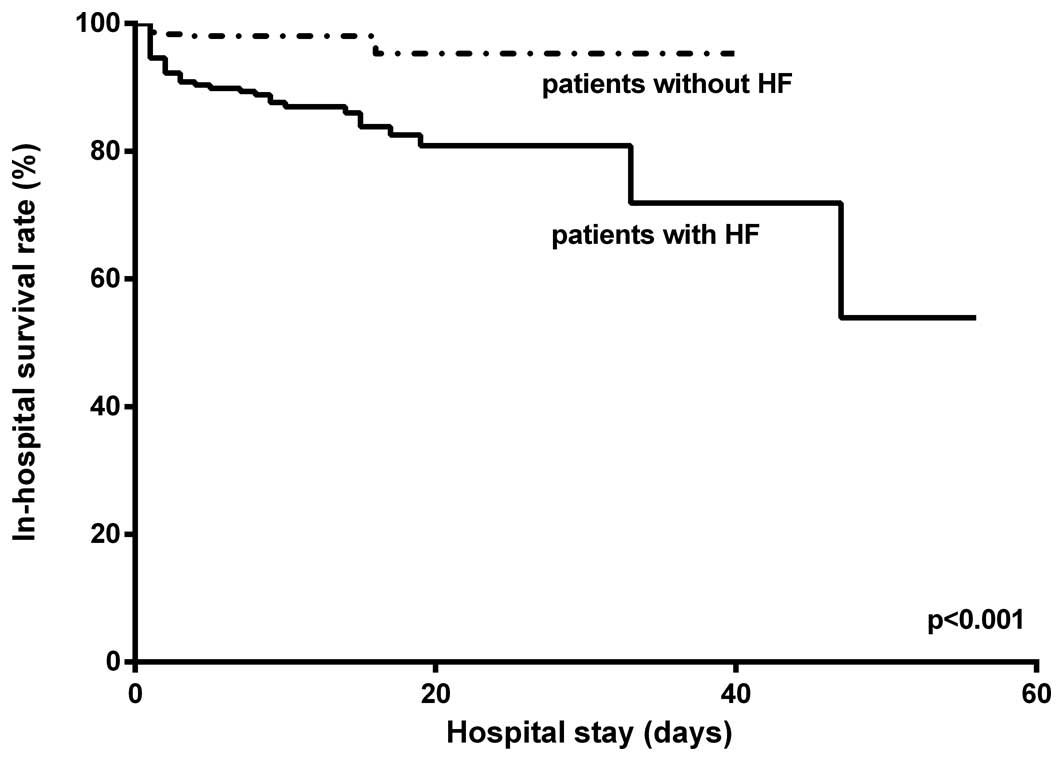|
1
|
World Health Organization: Cardiovascular
diseases: Fact sheet 317. http://www.who.int/mediacentre/factsheets/fs317/en/index.htmlAccessed.
March 19–2016
|
|
2
|
Zhao S, Zhang Z, Long Q, Ma Y, Lian X,
Yang Y, Gao W, Chen X and Wang L: Association between time of day
of sports-related physical activity and the onset of acute
myocardial infarction in a Chinese population. PLoS One.
11:e01464722016. View Article : Google Scholar : PubMed/NCBI
|
|
3
|
Baron T, Hambraeus K, Sundström J, Erlinge
D, Jernberg T and Lindahl B: TOTAL-AMI study group: Type 2
myocardial infarction in clinical practice. Heart. 101:101–106.
2015. View Article : Google Scholar : PubMed/NCBI
|
|
4
|
Xu T, Li W, Teo K, Wang XY, Liu LS and
Yusuf S: INTER-HEART China Investigators: Association of
psychological risk factors and acute myocardial infarction in
China: The INTER-HEART China study. Chin Med J (Engl).
124:2083–2088. 2011.PubMed/NCBI
|
|
5
|
Wolff JL, Starfield B and Anderson G:
Prevalence, expenditures, and complications of multiple chronic
conditions in the elderly. Arch Intern Med. 162:2269–2276. 2002.
View Article : Google Scholar : PubMed/NCBI
|
|
6
|
Schmidt M, Jacobsen JB, Lash TL, BØtker HE
and SØrensen HT: 25 year trends in first time hospitalization for
acute myocardial infarction, subsequent short and long term
mortality, and the prognostic impact of sex and comorbidity: A
Danish nationwide cohort study. BMJ. 344:e3562012. View Article : Google Scholar : PubMed/NCBI
|
|
7
|
Cabiddu R, Trimer R, Monteiro CI,
Borghi-Silva A, Trimer V, Carvalho P, Rocha T, Paredes S, Bianchi
AM and Henriques J: Correlation between autonomous function and
left ventricular performance after acute myocardial infarction.
Conf Proc IEEE Eng Med Biol Soc. 2015:3343–3346. 2015.PubMed/NCBI
|
|
8
|
Hunt SA, Abraham WT, Chin MH, Feldman AM,
Francis GS, Ganiats TG, Jessup M, Konstam MA, Mancini DM, Michl K,
et al: ACC/AHA 2005 guideline update for the diagnosis and
management of chronic heart failure in the adult: a report of the
American College of Cardiology/American Heart Association Task
Force on Practice Guidelines (Writing Committee to Update the 2001
Guidelines for the Evaluation and Management of Heart Failure).
American College of Cardiology. http://www.acc.org/clinical/guidelines/failure//index.pdfAccessed.
December 17–2015
|
|
9
|
Greco C, Rosato S, D'Errigo P, Mureddu GF,
Lacorte E and Seccareccia F: Trends in mortality and heart failure
after acute myocardial infarction in Italy from 2001 to 2011. Int J
Cardiol. 184:115–121. 2015. View Article : Google Scholar : PubMed/NCBI
|
|
10
|
Kramer JM, Newby LK, Chang WC, Simes RJ,
Van de Werf F, Granger CB, Lee KL, White HD, Piegas LS, Topol EJ,
et al: SYMPHONY and 2nd SYMPHONY Investigators: International
variation in the use of evidence-based medicines for acute coronary
syndromes. Eur Heart J. 24:2133–2241. 2003. View Article : Google Scholar : PubMed/NCBI
|
|
11
|
Fischbacher CM, Bhopal R, Povey C, Steiner
M, Chalmers J, Mueller G, Jamieson J and Knowles D: Record linked
retrospective cohort study of 4.6 million people exploring ethnic
variations in disease: Myocardial infarction in South Asians. BMC
Public Health. 7:1422007. View Article : Google Scholar : PubMed/NCBI
|
|
12
|
Yoo BS, Oh J, Hong BK, Shin DH, Bae JH,
Yang DH, Shim WJ, Kim HS, Kim SH, Choi JO, et al: Survey of
guideline adherence for treatment of systolic heart failure in real
world (SUGAR): A multi-center, retrospective observational study.
PLoS One. 9:e865962014. View Article : Google Scholar : PubMed/NCBI
|
|
13
|
Gjesing A, Schou M, Torp-Pedersen C, Køber
L, Gustafsson F, Hildebrandt P, Videbæk L, Wiggers H, Demant M,
Charlot M and Gislason GH: Patient adherence to evidence-based
pharmacotherapy in systolic heart failure and the transition of
follow-up from specialized heart failure outpatient clinics to
primary care. Eur J Heart Fail. 15:671–678. 2013. View Article : Google Scholar : PubMed/NCBI
|
|
14
|
Chongqing Municipality Bureau of
Statistics. Chongqing Statistical Yearbook 2015 (Beijing). Chines
Statistics Press. 2015.
|
|
15
|
Thygesen K, Alpert JS, Jaffe AS, Simoons
ML, Chaitman BR and White HD: Writing Group on behalf of the Joint
ESC/ACCF/AHA/WHF Task Force for the Universal Definition of
Myocardial Infarction: Third universal definition of myocardial
infarction. Glob Heart. 7:275–295. 2012. View Article : Google Scholar : PubMed/NCBI
|
|
16
|
Juillière Y, Cambou JP, Bataille V, Mulak
G, Galinier M, Gibelin P, Benamer H, Bouvaist H, Méneveau N, Tabone
X, et al: Heart failure in acute myocardial infarction: A
comparison between patients with or without heart failure criteria
from the FAST-MI registry. Rev Esp Cardiol (Engl Ed). 65:326–333.
2012. View Article : Google Scholar : PubMed/NCBI
|
|
17
|
Yancy CW, Jessup M, Bozkurt B, Butler J,
Casey DE Jr, Drazner MH, Fonarow GC, Geraci SA, Horwich T, Januzzi
JL, et al: 2013 ACCF/AHA guidelines for the management of heart
failure: A report of the American college of cardiology
foundation/American heart association task force on practice
guideline. J Am Coll Cardilo. 62:e147–e239. 2013. View Article : Google Scholar
|
|
18
|
Goldberg RJ, Spencer FA, Gore JM, Lessard
D and Yarzebski J: Thirty-year trends (1975 to 2005) in the
magnitude of, management of and hospital death rates associated
with cardiogenic shock in patients with acute myocardial
infarction: A population-based persective. Circulation.
119:1211–1219. 2009. View Article : Google Scholar : PubMed/NCBI
|
|
19
|
Pham PA, Pham PT, Pham PC, Miller JM, Pham
PM and Pham SV: Implications of bleeding in acute coronary syndrome
and percutaneous coronary intervention. Vasc Health Risk Manag.
7:551–567. 2011. View Article : Google Scholar : PubMed/NCBI
|
|
20
|
Andersson C, Mérie C, Jørgensen M,
Gislason GH, Torp-Pedersen C, Overgaard C, Køber L, Jensen PF and
Hlatky MA: Association of β-blocker therapy with risks of adverse
cardiovascular events and deaths in patients with ischemic heart
disease undergoing noncardiac surgery: A Danish nationwide cohort
study. JAMA Intern Med. 174:336–344. 2014. View Article : Google Scholar : PubMed/NCBI
|
|
21
|
Hersi A, Alhabib KF, Alsheikh-Ali AA,
Sulaiman K, Alfaleh HF, Alsaif S, Al-Mahmeed W, Asaad N, Amin H,
Al-Motarreb A and Al Suwaidi J: Short-term and long-term mortality
associated with ventricular arrhythmia in patients hospitalized
with acute coronary syndrome: Findings from the Gulf RACE
registry-2. Coron Artery Dis. 24:160–164. 2013. View Article : Google Scholar : PubMed/NCBI
|
|
22
|
McManus DD, Chinali M, Saczynski JS, Gore
JM, Yarzebski J, Spencer FA, Lessard D and Goldberg RJ: 30-year
trends in heart failure in patients hospitalization with acute
myocardial infarction. Am J Cardiol. 107:353–359. 2011. View Article : Google Scholar : PubMed/NCBI
|
|
23
|
Kaul P, Ezekowitz JA, Armstrong PW, Leung
BK, Savu A, Welsh RC, Quan H, Knudtson ML and McAlister FA:
Incidence of heart failure and mortality after acute coronary
syndromes. Am Heart J. 165:379–385.e2. 2013. View Article : Google Scholar : PubMed/NCBI
|
|
24
|
Gupta T, Harikrishnan P, Kolte D, Khera S,
Subramanian KS, Mujib M, Masud A, Palaniswamy C, Sule S, Jain D, et
al: Trends in management and outcomes of ST-elevation myocardial
infarction in patients with end-stage renal disease in the United
States. Am J Cariol. 115:1033–1041. 2015. View Article : Google Scholar
|
|
25
|
Geng W, Tian X, Fu X, Wang P, Wang Y, Wang
X, Li W and Liu X: Early routine angioplasty versus selective
angioplasty after successful thrombolysis in acute ST-segment
elevation myocardial infarction. Coron Artery Dis. 24:238–243.
2013. View Article : Google Scholar : PubMed/NCBI
|
|
26
|
Poulin MF, Appis A, Purim-Shem-Tov Y,
Schaer GL and Snell J: Impact of a Novel international platform and
hospital design on the door-to-balloon time in patients presenting
with ST-segment elevation myocardial infarction. Crit Pathw
Cardiol. 14:39–43. 2015. View Article : Google Scholar : PubMed/NCBI
|
|
27
|
Concannon TW, Nelson J, Goetz J and
Griffith JL: A percutaneous coronary intervention lab in every
hospital? Circ Cardiovasc Qual Outcomes. 5:14–20. 2012. View Article : Google Scholar : PubMed/NCBI
|
|
28
|
Fosbøl EL, Granger CB, Peterson ED, Lin L,
Lytle BL, Shofer FS, Lohmeier C, Mears GD, Garvey JL, Corbett CC,
et al: Prehospital system delay in ST-segment elevation myocardial
infarction care: A novel linkage of emergency medicine services and
inhospital registry data. Am Heart J. 165:363–370. 2013. View Article : Google Scholar : PubMed/NCBI
|
|
29
|
Koul S, Andell P, Martinsson A, Gustav
Smith J, van der Pals J, Scherstén F, Jernberg T, Lagerqvist B and
Erlinge D: Delay from first medical contact to primary PCI and
all-cause mortality: A nationwide study of patients with
ST-elevation myocardial infarction. J Am Heart Assoc.
3:e0004862014. View Article : Google Scholar : PubMed/NCBI
|
|
30
|
O'Gara PT, Kushner FG, Ascheim DD, Casey
DE Jr, Chung MK, de Lemos JA, Ettinger SM, Fang JC, Fesmire FM,
Franklin BA, et al: CF/AHA Task Force: 2013 ACCF/AHA guideline for
the management of ST-elevation myocardial infarction: executive
summary: A report of the American College of Cardiology
Foundation/American Heart Association Task Force on Practice
Guidelines. Circulation. 127:529–555. 2013. View Article : Google Scholar : PubMed/NCBI
|
|
31
|
Minha S, Loh JP, Satler LF, Pendyala LK,
Barbash IM, Magalhaes MA, Suddath WO, Pichard AD, Torguson R and
Waksman R: Transfer distance effect on reperfusion: Timeline of
ST-elevation patients transferred for primary percutanenous
coronary intervention. Cardiovasc Revasc Med. 15:369–374. 2014.
View Article : Google Scholar : PubMed/NCBI
|
|
32
|
Lazzarini V, Mentz RJ, Fiuzat M, Metra M
and O'Connor CM: Heart failure in elderly patients: Distinctive
features and unresolved issue. Eur J Heart Fail. 15:717–723. 2013.
View Article : Google Scholar : PubMed/NCBI
|
|
33
|
Ong HT, Ong LM and Ho JJ:
Angiotensin-converting enzyme inhibitors (ACEIs) and
angiotensin-receptor blockers (ARBs) in patients at high risk of
cardiovascular events: A meta-analysis of 10 randomized
placebo-controlled trials. ISRN Cardiol. 2013:4785972013.
View Article : Google Scholar : PubMed/NCBI
|
|
34
|
Hernandez AF, Hammill BG, O'Connor CM,
Schulman KA, Curtis LH and Fonarow GC: Clinical effectiveness of
beta-blockers in heart failure: Findings from the OPTIMIZE-HF
(organized program to initiate lifesaving treatment in hospitalized
patients with heart failure) registry. J Am Coll Cardiol.
53:184–192. 2009. View Article : Google Scholar : PubMed/NCBI
|
|
35
|
Eschalier R, Chenaf C, Mulliez A, Yalioua
A, Clerfond G, Authier N, Vorilhon C, Citron B, Pereira B, Jean F,
et al: Impact of clinical characteristics and management on the
prognosis of unselected heart failure patients. Cardiovasc Drugs
Ther. 29:89–98. 2015. View Article : Google Scholar : PubMed/NCBI
|
|
36
|
Hung J, Teng TH, Finn J, Knuiman M, Briffa
T, Stewart S, Sanfilippo FM, Ridout S and Hobbs M: Trends from 1996
to 2007 in incidence and mortality outcomes of heart failure after
acute myocardial infarction: A population-based study of 20, 812
patients with first acute myocardial infarction in Western
Australia. J Am Heart Assoc. 2:e0001722013. View Article : Google Scholar : PubMed/NCBI
|
|
37
|
Materson BJ, Reda DJ, Cushman WC, Massie
BM, Freis ED, Kochar MS, Hamburger RJ, Fye C, Lakshman R,
Gottdiener J, et al: The Department of Veterans Affairs Cooperative
Study Group on Antihypertensive Agents: Single-drug therapy for
hypertension in men: A comparison of six antihypertensive agents
with placebo. N Engl J Med. 328:914–921. 1993. View Article : Google Scholar : PubMed/NCBI
|
|
38
|
Prisant LM and Mensah GA: Use of
beta-adrenergic receptor blockers in blacks. J Clin Pharmacol.
36:867–873. 1996. View Article : Google Scholar : PubMed/NCBI
|
|
39
|
Youn YJ, Yoo BS, Lee JW, Kim JY, Han SW,
Jeon ES, Cho MC, Kim JJ, Kang SM, Chae SC, et al: KorHF Registry:
Treatment performance measures affect clinical outcomes in patients
with acute systolic heart failure. Circ J. 76:1151–1158. 2012.
View Article : Google Scholar : PubMed/NCBI
|
|
40
|
Gomez-Soto FM, Romero SP, Bernal JA,
Escobar MA, Puerto JL, Andrey JL, Almenara J and Gomez F: Mortality
and morbidity of non-systolic heart failure treated with
angiotensin-converting enzyme inhibitors: A propensity-adjusted
case-control study. Int J Cardiol. 139:276–282. 2010. View Article : Google Scholar : PubMed/NCBI
|
|
41
|
Guo S, Yang Z, Wu D, Yang C, Tao Y, Chen
F, Su W, Zheng R, Yang S, Li X and Chen J: A multi-centre survey on
the therapeutic status of patients with acute myocardial infarction
in Wuxi city of China. Zhonghua Xin Xue Guan Bing Za Zhi.
42:309–313. 2014.PubMed/NCBI
|
|
42
|
Lai EJ, Grubisic M, Palepu A, Quan H, King
KM and Khan NA: Cardiac medication prescribing and adherence after
acute myocardial infarction in Chinese and South Asian Canadian
patients. BMC Cardiovasc Disord. 11:562011. View Article : Google Scholar : PubMed/NCBI
|
|
43
|
Jiang H and Ge J: Epidemiology and
clinical management of cardiomyopathies and heart failure in China.
Heart. 95:1727–1731. 2009. View Article : Google Scholar : PubMed/NCBI
|
|
44
|
Teo KK, Liu L, Chow CK, Wang X, Islam S,
Jiang L, Sanderson JE, Rangarajan S and Yusuf S: INTERHEART
Investigators in China: Potential modifiable risk factors
associated with myocardial infarction in China: The INTERHEART
China study. Heart. 95:1857–1864. 2009. View Article : Google Scholar : PubMed/NCBI
|
|
45
|
Doughty RN, Rodgers A, Sharpe N and
MacMahon S: Effects of beta-blocker therapy on mortality in
patients with heart failure: A systematic overview of randomized
controlled trails. Eur Heart J. 18:560–565. 1997. View Article : Google Scholar : PubMed/NCBI
|
|
46
|
Yang ZJ, Liu J, Ge JP, Chen L, Zhao ZG and
Yang WY: China National Diabetes and Metabolic Disorders Study
Group: Prevalence of cardiovascular disease risk factor in the
Chinese population: The 2007–2008 China National Diabetes and
Metabolic Disorders Study. Eur Heart J. 33:213–220. 2012.
View Article : Google Scholar : PubMed/NCBI
|
|
47
|
McMurray JJ, Adamopoulos S, Anker SD,
Auricchio A, Böhm M, Dickstein K, Falk V, Filippatos G, Fonseca C,
Gomez-Sanchez MA, et al: ESC Committee for Practice Guidelines: ESC
Guidelines for the diagnosis and treatment of acute and chronic
heart failure 2012: The Task Force for the Diagnosis and Treatment
of Acute and Chronic Heart Failure 2012 of the European Society of
Cardiology. Developed in collaboration with the Heart Failure
Association (HFA) of the ESC. Eur Heart J. 33:1787–1847. 2012.
View Article : Google Scholar : PubMed/NCBI
|
|
48
|
Strauss MH and Hall AS: The divergent
cardiaovascular effects of angiotensin converting enzyme inhibitors
and angiotensin receptor blockers on myocardial infarction and
death. Prog Cardiovasc Dis. Nov 14–2015.(Epub ahead of print).
View Article : Google Scholar : PubMed/NCBI
|
|
49
|
Xie W, Zheng F, Song X, Zhong B and Yan L:
Renni-angiotensin-aldosterone system blockers for heart failure
with reduced ejection fraction or left ventricular dysfunction:
Network meta-analysis. Int J Cardiol. 205:65–71. 2016. View Article : Google Scholar : PubMed/NCBI
|
|
50
|
Swedberg K, Cleland J, Dargie H, Drexler
H, Follath F, Komajda M, Tavazzi L, Smiseth OA, Gavazzi A, Haverich
A, et al: Task Force for the Diagnosis and Treatment of Chronic
Heart Failure of the European Society of Cardiology: Guidelines for
the diagnosis and treatment of chronic heart failure: Executive
summary (update 2005): The Task Force for the Diagnosis and
Treatment of Chronic Heart Failure of the European Society of
Cardiology. Eur Heart J. 26:1115–1140. 2005. View Article : Google Scholar : PubMed/NCBI
|
|
51
|
Van de Werf F, Ardissino D, Betriu A,
Cokkinos DV, Falk E, Fox KA, Julian D, Lengyel M, Neumann FJ,
Ruzyllo W, et al: Task Force on the Management of Acute Myocardial
Infarction of the European Society of Cardiology: Management of
acute myocardial infarction in patients presenting with ST-segment
elevation. Eur Heart J. 24:28–66. 2003. View Article : Google Scholar : PubMed/NCBI
|
|
52
|
Dang H, Wang Q, Wang H, Yan M and Liu X:
The integration of Chinese material medica into the Chinese Health
Care Delivery System, an update. Phytother Res. 30:292–297. 2016.
View Article : Google Scholar : PubMed/NCBI
|
|
53
|
Huynh T, Perron S, O'Loughlin J, Joseph L,
Labrecque M, Tu JV and Théroux P: Comparison of primary
percutaneous coronary intervention and fibrinolytic therapy in
ST-segment-elevation myocardial infarction: Bayesian hierarchical
meta-analyses of randomized controlled trials and observational
studies. Circulation. 119:3101–3109. 2009. View Article : Google Scholar : PubMed/NCBI
|
|
54
|
Harjola VP, Follath F, Nieminen MS,
Brutsaert D, Dickstein K, Drexler H, Hochadel M, Komajda M,
Lopez-Sendon JL, Ponikowski P and Tavazzi L: Characteristics,
outcomes and predictors of mortality at 3 months and 1 year in
patients hospitalized for acute heart failure. Eur J Heart Fail.
12:239–248. 2010. View Article : Google Scholar : PubMed/NCBI
|
|
55
|
Goldberg RJ, Samad NA, Yarzebski J,
Gurwitz J, Bigelow C and Gore JM: Temporal trends in cardiogenic
shock complicating acute myocardial infarction. N Engl J Med.
340:1162–1168. 1999. View Article : Google Scholar : PubMed/NCBI
|
|
56
|
Khan NA, Grubisic M, Hemmelgarn B,
Humphries K, King KM and Quan H: Outcomes after acute myocardial
infarction in South Asia, Chinese, and white patients. Circulation.
122:1570–1577. 2010. View Article : Google Scholar : PubMed/NCBI
|
|
57
|
Zhou L, Honma T and Kaku N: Comparison of
incidence, mortality and treatment of acute myocardial infarction
in hospitals in Japan and China. Kurume Med J. 39:279–284. 1992.
View Article : Google Scholar : PubMed/NCBI
|
|
58
|
Jones DA, Gallagher S, Rathod KS, Redwood
S, de Belder MA, Mathur A, Timmis AD, Ludman PF, Townend JN and
Wragg A: NICOR (National Institute for Cardiovascular Outcomes
Research): Mortality in South Asians and Caucasians after
percutaneous coronary intervention in the United Kingdom: An
observational cohort study of 279, 256 patients from the BCIS
(British cardiovascular intervention society) national database.
JACC Cardiovasc Interv. 7:362–371. 2014. View Article : Google Scholar : PubMed/NCBI
|
|
59
|
Campo G, Guastaroba P, Marzocchi A,
Santarelli A, Varani E, Vignali L, Sangiorgio P, Tondi S, Serenelli
C, De Palma R and Saia F: Impact of COPD on long-term outcome after
ST-segment elevation myocardial infarction receiving primary
percutaneous coronary intervention. Chest. 144:750–757. 2013.
View Article : Google Scholar : PubMed/NCBI
|
|
60
|
Vestbo J, Hurd SS, Agustí AG, Jones PW,
Vogelmeier C, Anzueto A, Barnes PJ, Fabbri LM, Martinez FJ,
Nishimura M, et al: Global stragegy for the diagnosis, management
and prevention of chronic obstructive pulmonary disease: GOLD
executive summary. Am J Respir Cirt Care Med. 187:347–365. 2013.
View Article : Google Scholar
|
|
61
|
Wang RT, Li JY, Cao ZG and Li Y: Mean
platelet volume is decreased during an acute exacerbation of
chronic obstructive pulmonary disease. Respirology. 18:1244–1248.
2013. View Article : Google Scholar : PubMed/NCBI
|
|
62
|
Campo G, Pavasini R, Malagù M, Punzetti S,
Napoli N, Guerzoni F, Papi A, Ceconi C and Contoli M: Relationship
between troponin elevation, cardiovascular history and adverse
events in patients with acute exacerbation of COPD. COPD.
12:560–567. 2015. View Article : Google Scholar : PubMed/NCBI
|
|
63
|
Wu Z, Yao C, Zhao D, Wu G, Wang W, Liu J,
Zheng Z and Wu Y: Sino-MONICA project: A collaborative study on
trends and determinants in cardiovascular diseases in China, Part
i: Morbidity and mortality monitoring. Circulation. 103:462–468.
2001. View Article : Google Scholar : PubMed/NCBI
|
|
64
|
Mello BH, Oliveira GB, Ramos RF, Lopes BB,
Barros CB, Carvalho Ede O, Teixeira FB, Arruda GD, Revelo MS and
Piegas LS: Validation of the Killip-Kimball classification and late
mortality after acute myocardial infarction. Arq Bras Cardiol.
103:107–117. 2014.(In English and Portuguese). PubMed/NCBI
|


















